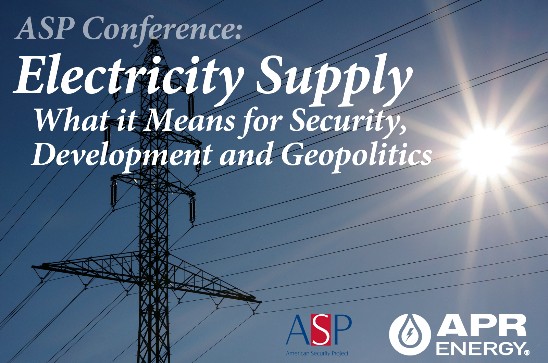 American Security Project
American Security Project
Electricity: The Catalyst for Change
Podcast: Play in new window | Download
Subscribe: Apple Podcasts | RSS
The first panel of ASP’s conference “Electricity Supply: What it Means for Security, Development & Geopolitics,” entitled “Electricity: The Catalyst for Change,” brought together an array of development and security experts to highlight the importance of energy and electricity generation around the globe. Each panelist stressed the importance of reliable, sustainable electricity as means to bring about peace, security, and stability.
Moderator Joanne Trotter, a Senior Adjunct Fellow at ASP, began by noting that without access to electricity, developing countries will be unable to support flourishing communities and successful economies, a sentiment that was continuously supported by all panelists.
Dr. Ryan Shelby, an Energy Engineering Advisor in USAID’s Bureau for Economic Growth, Education and Energy, continued by saying, “Within USAID one of our key focus areas is being able to help our host country partners really advance and make this transition to an advanced economy. And our view is that access to reliable and affordable energy particularly in the form of electricity is one of the key barriers that needs to be overcome to make [economic development] happen.”
“Electricity, both large and small-scale projects, is helping to build peace even across still very contentious borders,” explained Holly Dranginis, a policy analyst for the Enough Project. Dranginis illustrated the potential role of electricity in the Democratic Republic of the Congo and the Great Lakes Peace Process.
Electricity and economic development at large has become core to the peace building agenda… by first and foremost bring[ing] otherwise adversarial actors and parties to the table… development and profit is motivating in a way that brokering a ceasefire or negotiating with rebels can not.
Using hydropower projects in Central Africa as an example, Dranginis noted, “The difference between cooperation and destabilization is whether the projects actually benefit the local populations…If [electricity] projects are not touching the rights of youth and women,” they will not facilitate peace-building efforts.
Emphasizing the importance of electricity in the advent of climate change and to spur economic development, Sasanka Thilakasiri of Oxfam stated,
If we don’t address climate change, we don’t address poverty. 1.2 billion people don’t have electricity. There is no chance that we can fight poverty or hunger without access to electricity.
The majority of electricity-deficient people are the rural poor. Due to deficiencies in grids, it is hard to expand energy access to rural areas. Thilakasiri noted, “Large-scale energy won’t reach out to the rural population. You need more micro to affect more people…65% of the energy needs to come from the off-grid and micro-grid sources. So it makes sense to look at the more decentralized projects.”
Electricity bolsters security and stability efforts. Stability Operations specialist Mark Kustra USMC (Ret.) discussed the role of electricity in Iraq and Afghanistan: “If you don’t have security, you don’t have electricity. If you don’t have electricity, you don’t have security.” Iraq, Kustra said, had a developed, centralized electricity system. In the wake of Saddam Hussein’s fall in 2003, the Iraqi people expected power when mass looting and violence resulted in intermittent power at bests, increasing tensions in an already conflict laden environment.
However, maintaining electricity infrastructure and ensuring a sustainable supply of electricity in unstable regions is difficult. Unlike Iraq, Kustra noted, Afghanistan did not already possess a developed electricity grid, and lack of power was common. Therefore, in these hostile environments “energy infrastructure becomes a bane” to operate and requires “neutrality and [partnership] with NGOs to provide and distribute” a constant, reliable flow of electricity.
Large and small-scale electrification projects spur economic growth and development. Reliable access to power supports stability and facilitates peace-building efforts in conflict-ridden regions such as the DRC, Iraq, and Afghanistan. Lastly, providing sustainable electricity supply to the rural poor, youth, and women, is of paramount importance for it will foster greater societal resilience, enabling these populations to grow in the wake of the increasingly extreme impacts of climate change.





